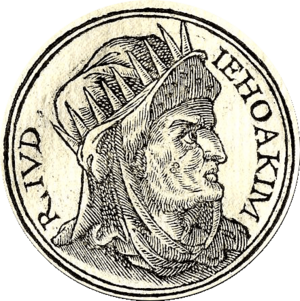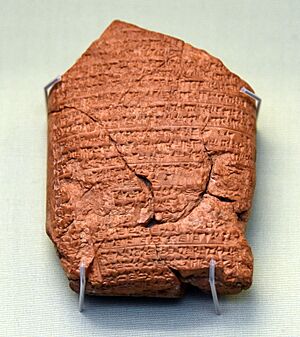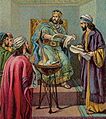Jehoiakim facts for kids
Quick facts for kids Jehoiakim |
|
|---|---|

Jehoiakim from Guillaume Rouillé's Promptuarii Iconum Insigniorum, 1553
|
|
| King of Judah | |
| Reign | 609–598 BC |
| Predecessor | Jehoahaz |
| Successor | Jehoiachin |
| Born | Eliakim c. 632 BC Jerusalem |
| Died | 598 BC Jerusalem |
| Spouse | Nehushta |
| Issue | Jehoiachin Zedekiah |
| House | House of David |
| Father | Josiah |
| Mother | Zebudah |
Jehoiakim was a king of Judah, an ancient kingdom. He ruled for eleven years, from 609 to 598 BC. He was the eighteenth king of Judah.
Jehoiakim was the second son of King Josiah. His mother was Zebidah. His birth name was Eliakim.
Contents
Becoming King of Judah
After King Josiah died, Jehoiakim's younger brother, Jehoahaz, became king. However, Jehoahaz ruled for only three months. The Pharaoh Necho II of Egypt removed him from power.
Pharaoh Necho II then made Eliakim king instead. When Eliakim became king, his name was changed to "Jehoiakim." This happened in 609 BC.
Jehoiakim's Rule and Challenges
Jehoiakim started his rule as a ruler under the Egyptian Pharaoh. He had to pay a lot of money, called a tribute, to Egypt. To get this money, he taxed the people of Judah heavily.
Changing Sides: Egypt to Babylon
Later, the Egyptians lost a big battle to the Babylonians in 605 BC. This battle was called the Battle of Carchemish. After this, Nebuchadnezzar II, the king of Babylon, attacked Jerusalem.
To save Jerusalem from being destroyed, Jehoiakim changed his loyalty. He stopped supporting Egypt and became a ruler under Babylon. He paid tribute to Babylon using money from Jerusalem's treasury. He also gave some valuable items from the temple.
As part of the agreement, some members of the royal family and important people were taken as hostages. They were sent to Babylon. The Book of Daniel in the Bible says that Daniel was one of these hostages.
Prophets and Their Warnings
During Jehoiakim's rule, the prophet Jeremiah spoke out. Jeremiah told the king and the people to change their ways and follow God's laws strictly. He warned them about what would happen if they didn't.
Another prophet named Uriah ben Shemaiah also shared a similar message. King Jehoiakim did not like these messages. He even ordered Uriah to be killed.
Final Years and Death
Jehoiakim remained loyal to Babylon for three years. But then, the Babylonians tried to invade Egypt in 601 BC and failed. This made their power in the area weaker.
Seeing this, Jehoiakim decided to switch his loyalty back to Egypt. In late 598 BC, the Babylonian king Nebuchadnezzar II returned. He attacked Judah again and began a siege (a military blockade) on Jerusalem.
Jehoiakim died before this siege ended. The Bible says that Nebuchadnezzar planned to take Jehoiakim to Babylon in chains. The prophet Jeremiah also said that Jehoiakim would not have a proper funeral. He prophesied that Jehoiakim's body would be "dragged and cast out beyond the gates of Jerusalem."
After Jehoiakim's Death
Jehoiakim was followed by his son, Jeconiah (also known as Jehoiachin), as king. However, Jeconiah ruled for only three months. Nebuchadnezzar removed Jeconiah from power.
Nebuchadnezzar then made Zedekiah, Jehoiakim's younger brother, the new king. Jeconiah, his family, and many people from Judah were taken away to Babylon. This event is known as the Babylonian captivity.
According to ancient records from Babylon, Jerusalem fell on March 16, 597 BC. These records describe how Nebuchadnezzar's army attacked Judah, captured the city, and took King Jeconiah prisoner. They then chose a new king and took valuable items back to Babylon.
Images for kids
 | DeHart Hubbard |
 | Wilma Rudolph |
 | Jesse Owens |
 | Jackie Joyner-Kersee |
 | Major Taylor |



